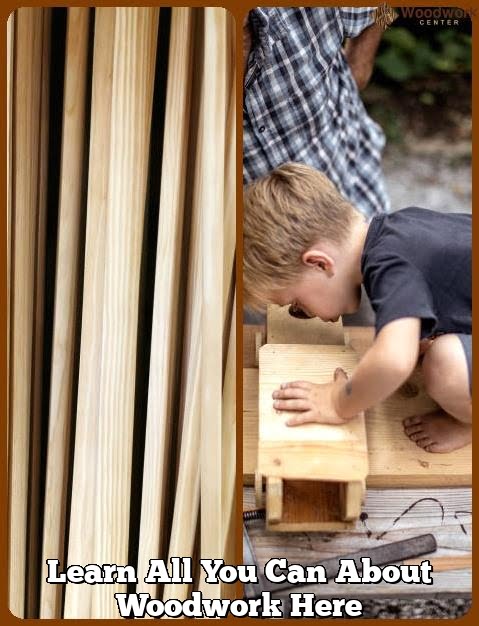Are you wondering where to find old woodworking tools that are full of character and history? Look no further. The allure of old woodworking tools lies not only in their functionality but also in their unique charm and rich history. In recent years, there has been a growing trend of woodworkers incorporating vintage tools into their modern projects, recognizing the value and quality of these timeless pieces.
Antique stores and flea markets are prime locations for hunting down old woodworking tools. Whether it’s a hand plane with intricate detailing or a vintage saw with a weathered handle, these places offer the opportunity to discover one-of-a-kind finds that can enhance your woodworking experience. With the right tips and guidance, navigating these venues can lead to procuring some exceptional pieces for your collection.
In addition to physical locations, online marketplaces provide an extensive selection of old woodworking tools to choose from. From specialized websites to popular platforms, the convenience of shopping online opens up a world of possibilities for finding vintage tools that may not be readily available in local brick-and-mortar stores.
Whether you’re searching for a specific type of tool or simply enjoy browsing through different options, exploring online marketplaces can be an exciting way to uncover hidden gems from the comfort of your own home.
Antique Stores and Flea Markets
If you’re on the hunt for old woodworking tools with character and history, antique stores and flea markets are great places to start. Antique stores often have a curated selection of vintage tools, ranging from hand planes to saws to chisels. When visiting antique stores, keep an eye out for tools that show signs of wear and use, as these can often be indicators of quality and durability.
Flea markets are another goldmine for finding old woodworking tools. These bustling marketplaces are where you can stumble upon unique and unexpected finds that may not be available anywhere else. To navigate flea markets successfully, it’s essential to arrive early when vendors are setting up and be prepared to haggle for the best prices on the items you find.
In both antique stores and flea markets, establishing a relationship with vendors can also be beneficial. They may keep an eye out for specific tools you’re in search of or even offer discounts on future purchases. Whether rummaging through the wares at a flea market or perusing the shelves of an antique store, these places are prime spots to discover hidden treasures that add character and history to your woodworking projects.
Online Marketplaces
When it comes to finding old woodworking tools, online marketplaces offer a convenient and far-reaching solution. Websites like eBay, Etsy, and Craigslist are popular platforms for buying and selling vintage tools. These sites often have dedicated sections for antique and vintage tools, making it easy to browse through various options. Additionally, specialty forums and groups focused on woodworking may also have their own online marketplaces or classified sections where members can buy, sell, or trade old tools.
One of the key benefits of shopping for old woodworking tools online is the extensive selection available. With just a few clicks, you can access a wide array of vintage hand planes, chisels, saws, and other woodworking implements from different eras. This allows you to compare prices, conditions, and authenticity in a way that might not be possible when shopping in person.
Furthermore, online marketplaces provide an opportunity to connect with sellers who are knowledgeable about old woodworking tools. Many reputable sellers will provide detailed descriptions and photographs of the items they are offering for sale, as well as information about the history or provenance of the tool. Some may even specialize in restoring and refurbishing vintage tools before putting them up for sale.
| Website | Description |
|---|---|
| eBay | Auction-style platform with a wide range of vintage woodworking tools |
| Etsy | Showcases unique handmade and vintage items including old woodworking tools |
| Craigslist | Local classified ad platform where individuals can buy and sell used items including antique woodworking tools |
Local Estate Sales and Auctions
If you’re wondering where to find old woodworking tools, estate sales and auctions in your area are a great place to start. Keep an eye out for advertisements in local newspapers or online platforms such as Craigslist or Facebook Marketplace. Additionally, there are websites dedicated to listing estate sales and auctions, making it easier for you to track down these events near you.
When attending estate sales, be sure to arrive early for the best selection of tools. A quick search online can also provide you with information about upcoming auctions held by professional auctioneers in your area.
Estate sales and auctions offer the potential for finding high-quality old woodworking tools. Since many of these events involve selling items from estates or collections, there is a chance you may come across unique or rare finds that are not typically available in other places. Keep an open mind and be prepared to thoroughly inspect items before making any purchases. With some luck and persistence, you may uncover hidden treasures at these events that will enhance your woodworking endeavors.
Attending local estate sales and auctions also provides the opportunity to connect with other woodworkers who share an interest in vintage tools. You can exchange tips on where to find old woodworking tools and even collaborate on identifying desirable pieces at these events. Building relationships within the woodworking community can lead to valuable insights and recommendations for future acquisitions of vintage tools.
Networking With Woodworking Communities
If you’re looking for old woodworking tools, networking with woodworking communities can be an excellent way to find unique and high-quality pieces. Building connections with fellow woodworkers not only provides access to a wealth of knowledge and experience, but it also opens up opportunities to acquire vintage tools. Here are some tips for leveraging these connections:
- Join local woodworking clubs or associations: Look for woodworking groups in your area and join them to connect with like-minded individuals who may have or know where to find old woodworking tools. These groups often have members who are passionate about preserving and using vintage tools, making them a valuable resource for locating rare finds.
- Attend woodworking events and workshops: Keep an eye out for woodworking events, such as exhibitions, fairs, or workshops, where you can meet other enthusiasts and professionals. These gatherings provide the perfect setting to network with individuals who share your passion for old woodworking tools and may have leads on where to find them.
- Engage on online forums and social media groups: Participate in online forums and social media groups dedicated to woodworking. These platforms often have discussions about where to find old tools, as well as buy, sell, or trade opportunities within the community. By actively engaging in these digital spaces, you can tap into a vast network of woodworkers who can point you in the right direction for sourcing vintage tools.
By building relationships within woodworking communities, you not only increase your chances of finding old woodworking tools but also gain access to a supportive network of individuals who share your appreciation for these timeless pieces. Networking with fellow woodworkers can lead to discovering hidden gems and learning from others’ experiences when it comes to preserving the legacy of vintage tools in modern craftsmanship.
Visiting Woodworking Museums and Historical Sites
Exploring Woodworking Museums
Woodworking museums often feature displays of old tools, providing a fascinating look at the evolution of woodworking equipment. Visitors can observe rare and unique hand tools, power tools, and other related items that were once essential to woodworkers. Many museums also offer these items for sale, allowing enthusiasts to add to their collection while supporting the preservation efforts of the museum.
Historical Sites and Workshops
Historical sites dedicated to woodworking may offer guided tours or workshops where visitors can learn about traditional woodworking methods and view demonstrations using old tools. Some sites even host events or sales featuring vintage tools, giving visitors the chance to purchase pieces that have been well-maintained by experts in the field. Additionally, historical societies or organizations focused on preserving traditional craftsmanship may hold special events where members can buy, sell, or trade old woodworking tools.
Restoring and Refurbishing Old Tools
Restoring and refurbishing old woodworking tools can be a rewarding and satisfying experience for woodworkers. Not only does it allow enthusiasts to bring new life to vintage tools, but it also provides an opportunity to appreciate the craftsmanship of these older pieces.
When looking to restore old tools, one of the first steps is to find them in suitable condition. This can involve browsing through various sources such as antique stores, flea markets, online marketplaces, local estate sales, auctions, and even woodworking museums or historical sites.
Many woodworkers enjoy the process of bringing old tools back to their former glory by cleaning and refurbishing them. This involves removing rust, sharpening blades, replacing worn-out parts, and applying a fresh coat of protective finish. Restoring old woodworking tools not only allows enthusiasts to use them in their own projects but also helps in preserving the history and legacy of these timeless pieces.
Woodworking experts recommend several products and techniques for restoring old woodworking tools including using a vinegar soak for removing rust, sanding or honing blades for sharpening, and utilizing a variety of oils for coating and protection. With the right knowledge and patience, even heavily worn-out tools can be restored to their original functionality.
| Restoration Technique | Recommended Product/Technique |
|---|---|
| Rust Removal | Vinegar Soak |
| Blade Sharpening | Sanding/Honing |
| Protective Coating | Various Oils (e.g. Linseed Oil) |
Building a Collection of Old Tools
There is a certain allure and charm that comes with collecting old woodworking tools. Many woodworkers take pride in curating a collection of vintage tools, not just for their functionality but also for their historical and aesthetic value. If you’re interested in starting your own collection of old tools, there are various avenues to explore and discover these timeless pieces.
Here are some ways where to find old woodworking tools:
- Antique Stores: Antique stores are treasure troves for old woodworking tools. From hand planes to chisels, you can often find unique and well-preserved tools that add character to your collection.
- Online Marketplaces: With the rise of e-commerce, many vintage woodworking tools can be found on online platforms such as eBay, Etsy, or specialized websites like OldTools.co.uk. These platforms offer a wide selection and the convenience of browsing from the comfort of your home.
- Local Estate Sales and Auctions: Keep an eye out for estate sales and auctions in your area. These events can be goldmines for finding high-quality old woodworking tools at reasonable prices.
So whether you prefer the thrill of hunting for treasures in person at flea markets or antique stores, or the convenience of browsing through online marketplaces, there are plenty of options available for building your own collection of old woodworking tools. Each tool tells a story and adds a layer of history to your workshop, enhancing both its functionality and aesthetics.
Conclusion
In conclusion, the charm and history of old woodworking tools continue to captivate woodworkers and enthusiasts alike. The growing trend of using vintage tools in modern woodworking speaks to the enduring appeal of these timeless instruments. Whether found in antique stores, flea markets, online marketplaces, estate sales, or through networking with woodworking communities, there are countless opportunities to acquire old woodworking tools.
The satisfaction of preserving and continuing the legacy of these tools is a rewarding endeavor for those who appreciate their value. Restoring and refurbishing old tools not only brings them back to life but also allows woodworkers to experience the joy of using these historic pieces in their projects. Building a collection of old tools can also be a source of pride and inspiration for craftsmen as they curate and display these vintage pieces in their workshop.
Ultimately, seeking out and using vintage woodworking tools is not just about practicality but also about embracing the craftsmanship and artistry of bygone eras. By recognizing the beauty and significance of old woodworking tools, individuals can contribute to the ongoing legacy of these timeless instruments for generations to come.
Whether it’s through hunting for unique finds at flea markets or fostering connections within woodworking communities, there are numerous avenues where one can find old woodworking tools to cherish and utilize in their craft.
Frequently Asked Questions
How to Get Free Woodworking Tools?
There are a few ways to get free woodworking tools. One method is to check online marketplaces, community forums, or social media groups for people giving away used tools for free. Another option is to attend local woodworking clubs or meetups, where members may be willing to donate or trade unused tools with others.
Where Is the Best Place to Find Used Hand Tools?
The best place to find used hand tools is at yard sales, flea markets, and thrift stores. These places often have a wide selection of affordable hand tools in various conditions. Additionally, online auction sites and classified ads can be valuable resources for finding quality used hand tools at reasonable prices.
How Do I Find Old Tools?
There are several ways to find old tools, such as visiting antique shops, estate sales, or auctions. These locations often have a range of vintage and collectible tools that can be collected or repurposed for use in woodworking projects.
Additionally, connecting with experienced woodworkers or tradespeople who may have old tools they no longer need could also lead to acquiring some unique and valuable finds.

Hi everyone! I’m a woodworker and blogger, and this is my woodworking blog. In my blog, I share tips and tricks for woodworkers of all skill levels, as well as project ideas that you can try yourself.





